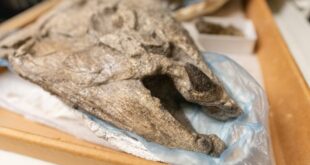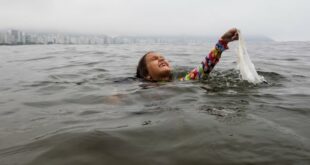'It's kind of like I lost a relative," said a local involved in the rescue effort

A female killer whale that beached in northern Vancouver Island died on Saturday despite efforts by the community to push the mammal back into the water.
Video of the incident, which occurred near the village of Zeballos on the island's northwest coast, shows dozens of people trying to save the stranded orca.
The female orca was stranded on shore in the Little Espinosa Inlet, about nine kilometres southwest of the village, at low tide while a calf swam nearby, said Florence Bruce of the Ehattesaht First Nation.
Bruce and her fiancée, Kyle Harry, were among some 30 people present for the rescue effort.
"The whale was giving a really big fight before it passed away," Bruce told CBC News.

The group tried to roll the mammal onto its belly and provide it with as much water as they could for about two hours before it breathed its last, Bruce said.
"I am so sad inside. It's kind of like I lost a relative," she said.
Harry sang a prayer song for the departed orca.
"Other nations are also coming together on Facebook Live and singing their songs for [the orca] too," he said.
While the circumstances around the stranding remain unclear, Marine Education and Research Society (MERS) — a conservation charity based in Port McNeill, speculates the orca may have ventured ashore during a high tide, possibly for hunting purposes.
In a social media post, the society said the area where the incident took place "is highly influenced by changes in tides."
"When the tide ebbs in this particular spot, it happens very quickly," the society wrote.
The calf, which remained near its deceased mother, faces an uncertain future.
In its post, MERS said its survival depends on various factors including its age and "the family structure of these whales."
Search continues to reunite baby orca with pod
Rescuers on site say they are scouring nearby waters to bring the baby back to its pod.
A Facebook post from Judae Smith, who oversees operations and maintenance in the Nuchatlaht First Nation's fisheries department, says they are also looking for the pod of killer whales.
"We have six [boats] going out to look to bring the baby to the pod," Smith posted on Facebook Saturday.
CBC News has reached out to Smith for further details.
CBC News also reached out to the Department of Fisheries and Oceans (DFO) on the status of the baby orca, but didn't get a response by publication deadline.
Paul Cottrell, a marine mammal co-ordinator with DFO, confirmed to CBC News that he is on the scene responding to the orca death but declined an interview, citing network issues.
*****
Credit belongs to : www.cbc.ca
 MaharlikaNews | Canada Leading Online Filipino Newspaper Portal The No. 1 most engaged information website for Filipino – Canadian in Canada. MaharlikaNews.com received almost a quarter a million visitors in 2020.
MaharlikaNews | Canada Leading Online Filipino Newspaper Portal The No. 1 most engaged information website for Filipino – Canadian in Canada. MaharlikaNews.com received almost a quarter a million visitors in 2020.







